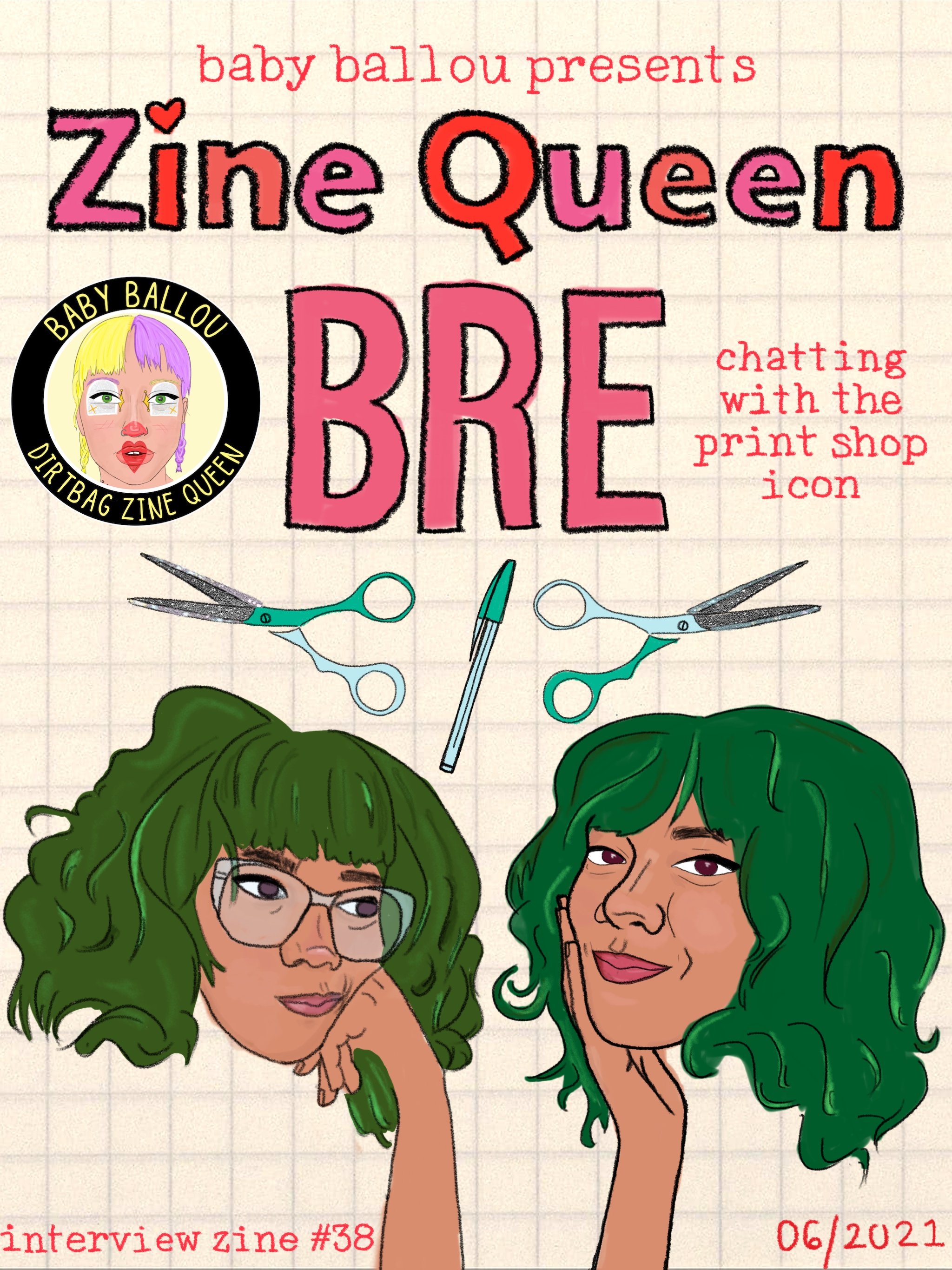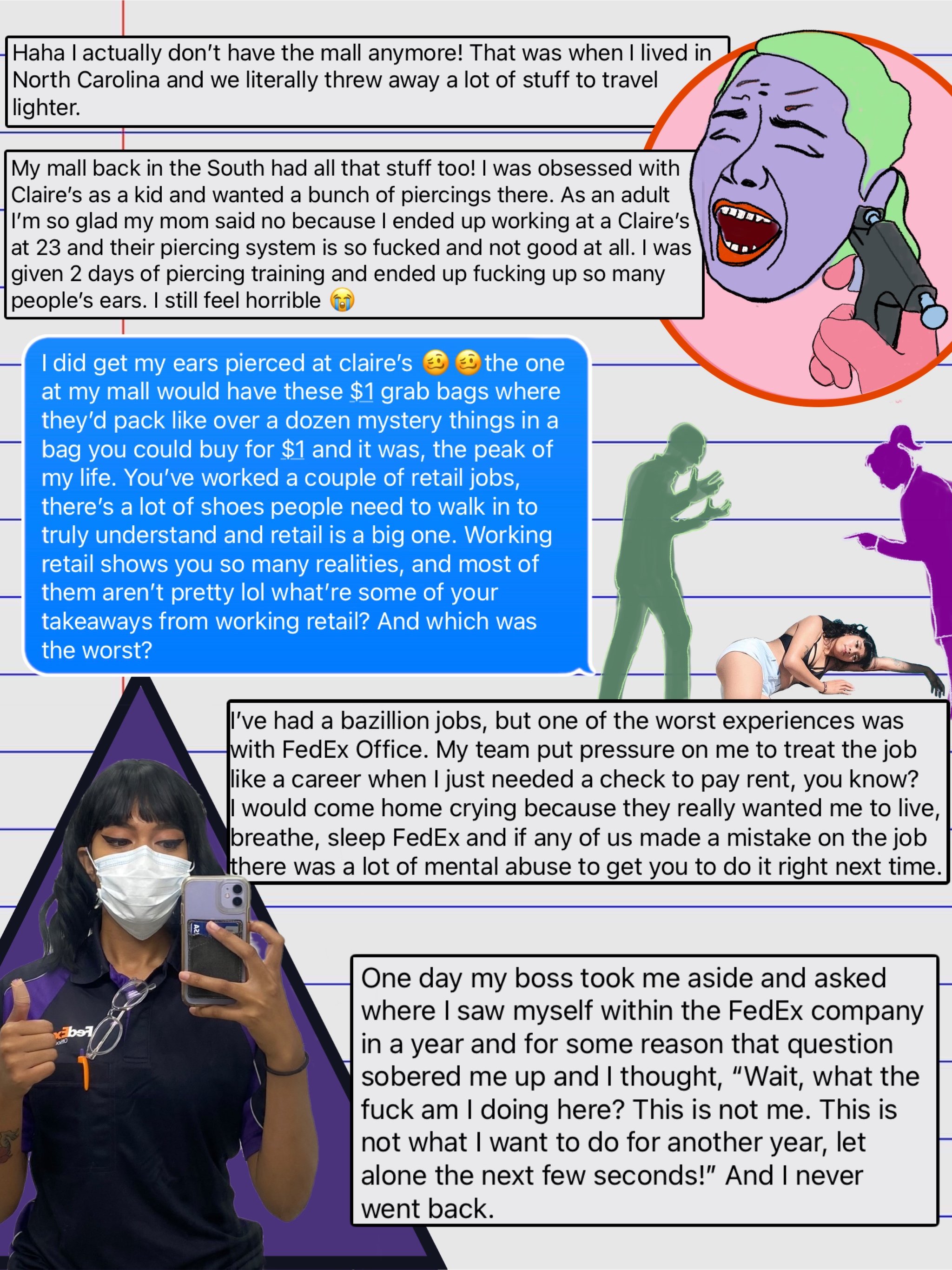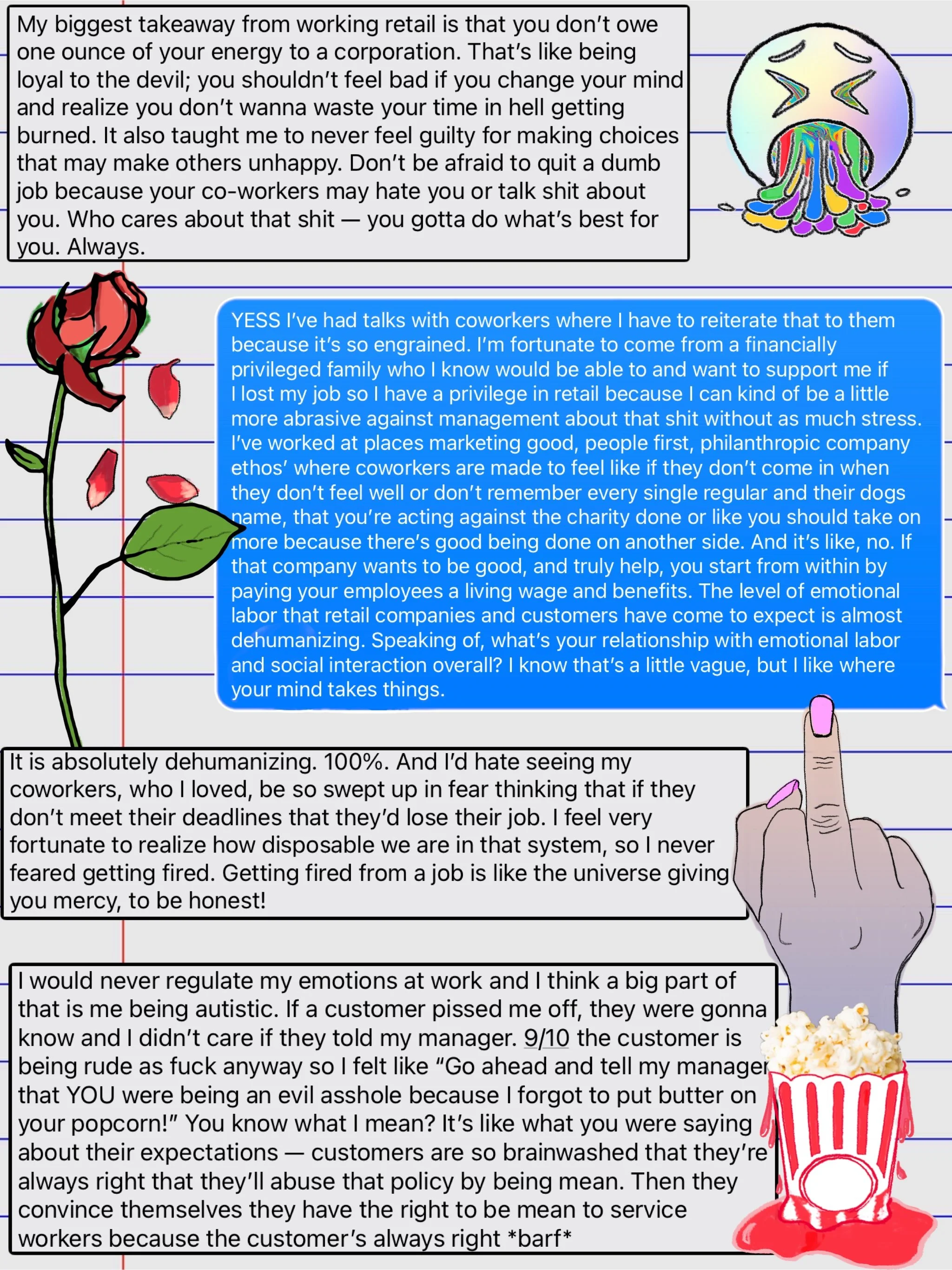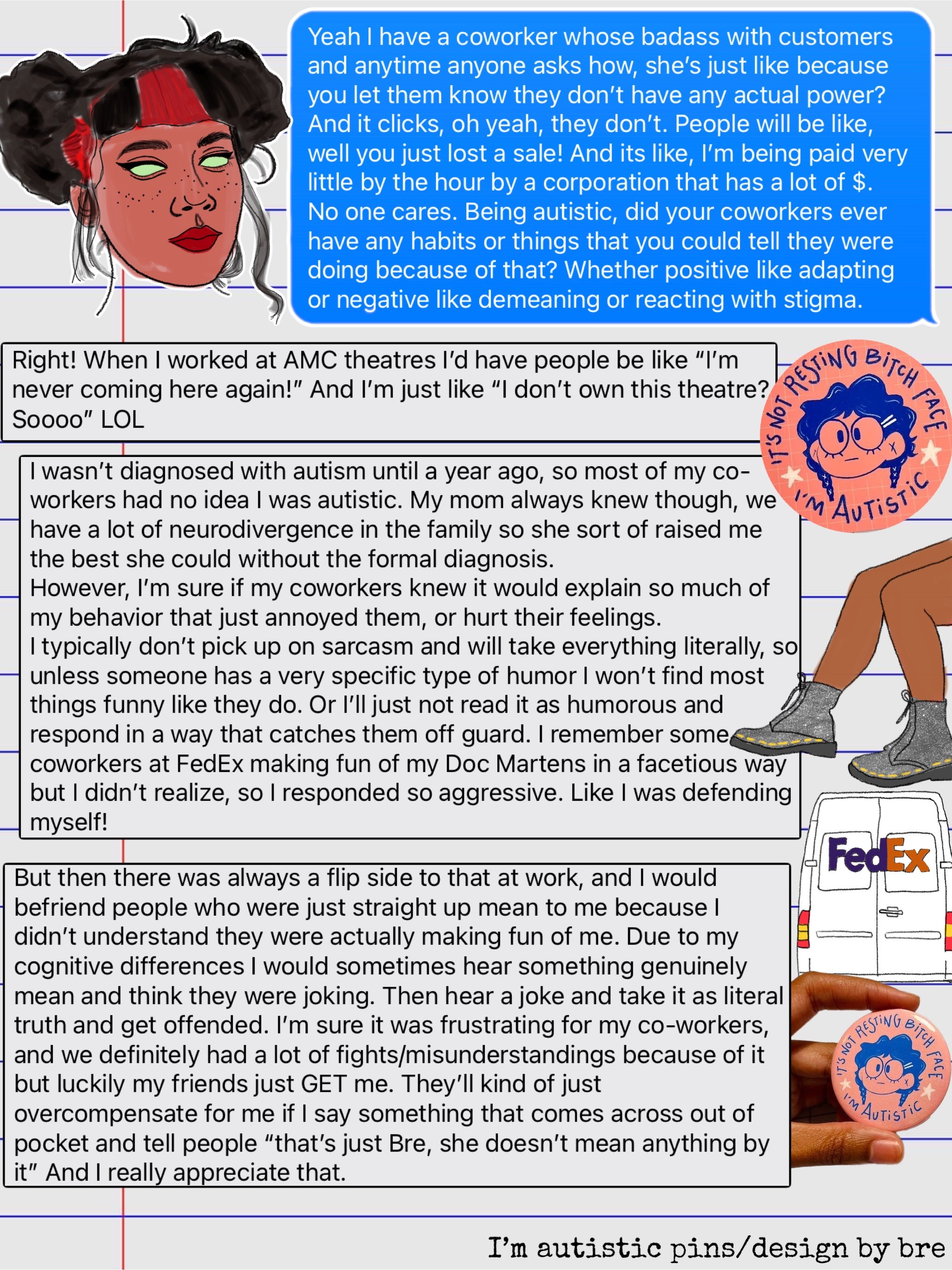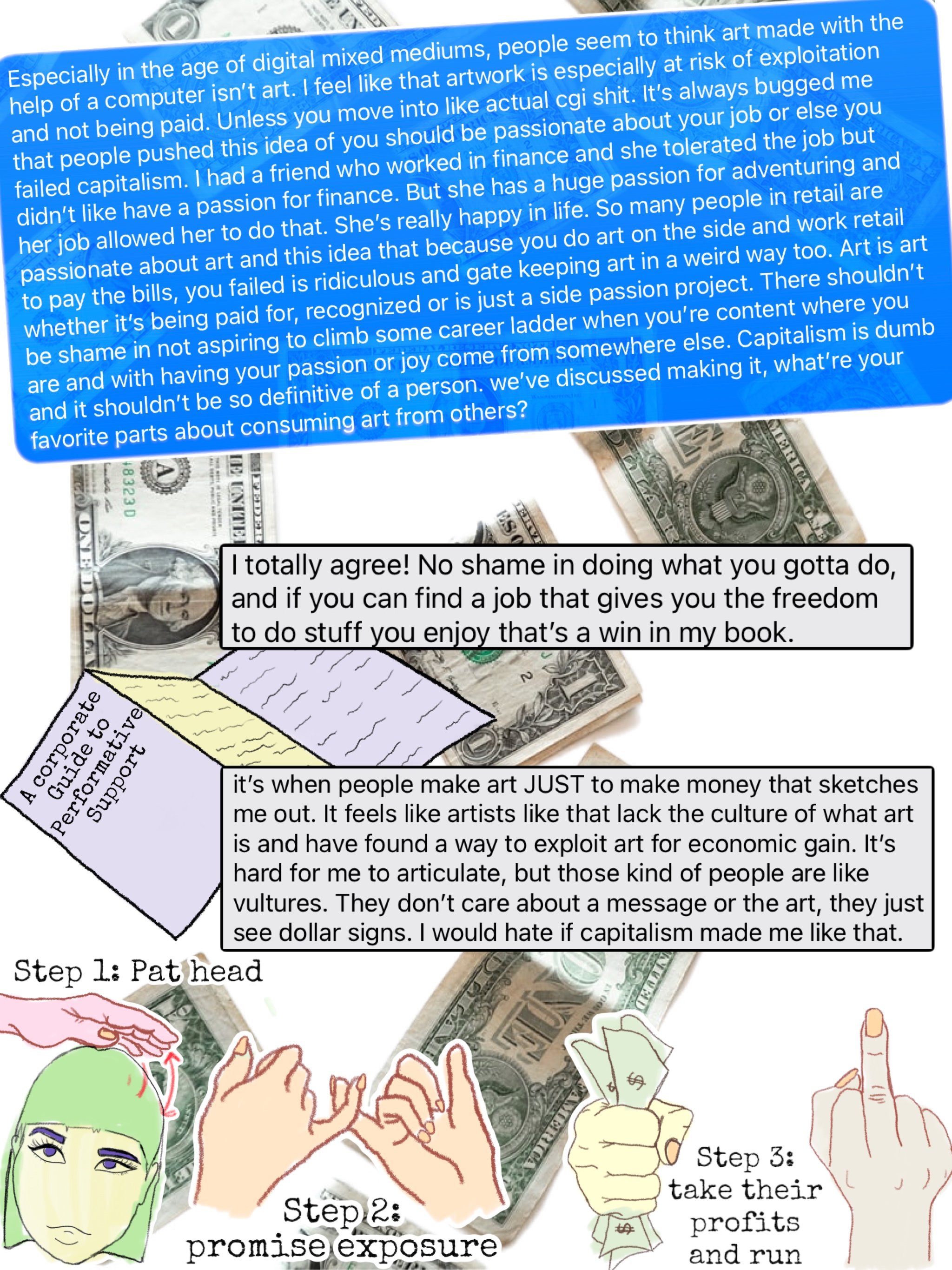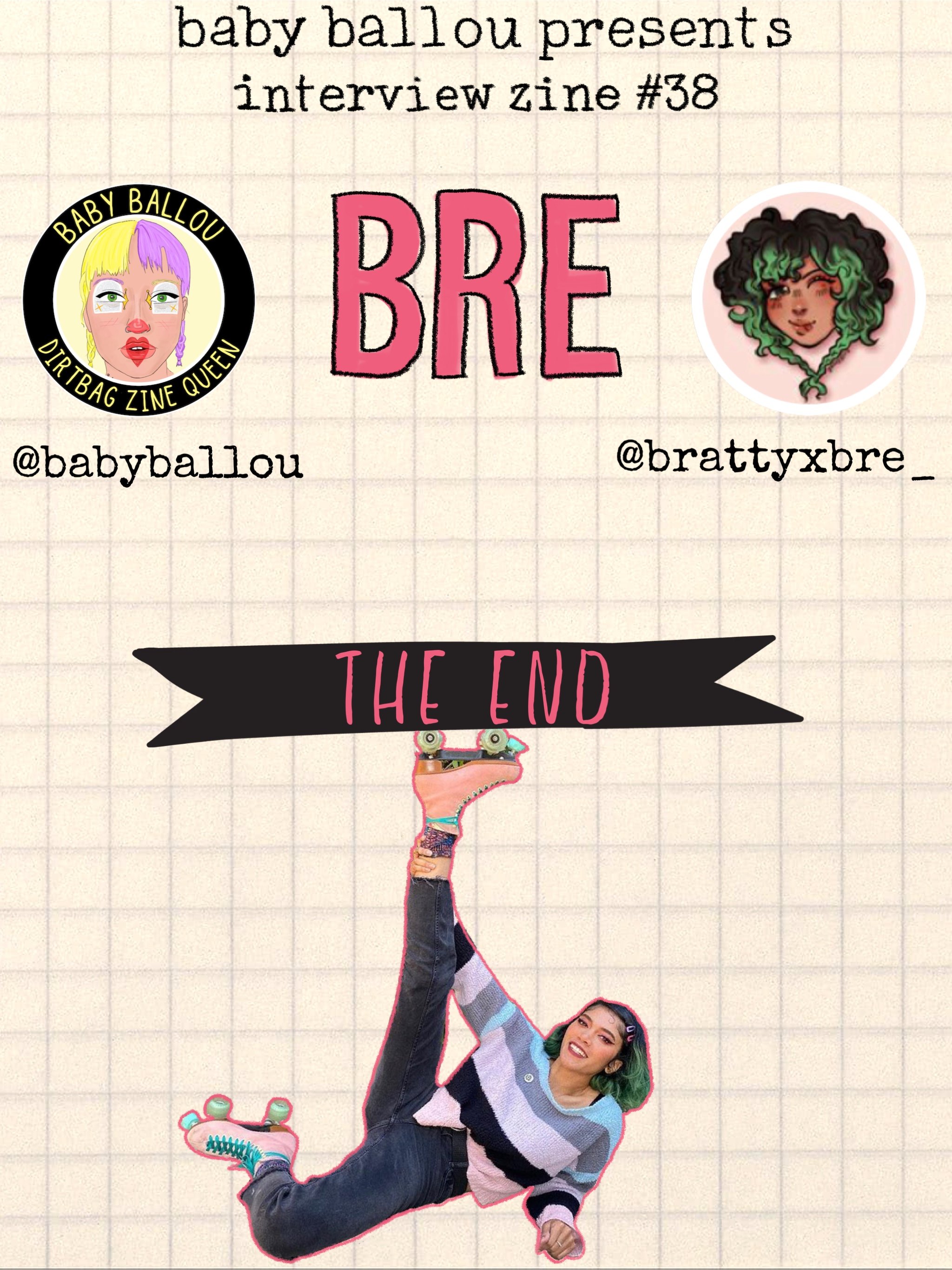Zine 38: Bre
BRE’S SHOP
FOLLOW BRE ON INSTA
The first piece by Bre I read was Depression is A Forced Smile, Not A Frown…(Personal thoughts on Morrissey). I’d found her on Tik Tok and asked if we could do a zine exchange; “I’m super excited to see the kind you make. That’s the best part of trading - seeing such unique points of view,” she said in her note. (If It doesn’t need to be typed, Bre is gonna write it by hand. Her handwriting reminded me of my moms; beautiful, elegant but warm.) It wasn’t until I opened it to a random page and saw the typewriter styled out essay with a simple photograph of Morrissey to its left that I realized; oh fuck, I haven’t read-read in years. My brain, chemically wired to combat any attempts at focusing on one thing alone, slammed the brakes so hard I swear my head started ringing. But by the end of the first paragraph, I was hooked by this tongue-in-cheek perspective able to land playful jabs without feeling dismissive. I would later see that most of Bre’s work is a combination of art and words. That perspective remained throughout; somehow concocting a snark with no attitude-filled aftertaste. Whether she’s commenting on a larger experience or being the level of open and vulnerable that us neuro-divergent kids normally reserve for the third or fourth therapist appointment, Bre takes her cow-print manicured nail tip, and drags it across her chest to reveal a chance to not only see inside but plop down and make yourself at home. In homage to her 2021 release, You Kinda Suck Issue #2, which includes some music suggestions, I want to end this intro letter with album suggestions that remind me of Bre’s writing and art.
A Playlist for Bre
Synthetica by Metric
1992 Deluxe by Princess Nokia
A Guide to Love, Loss & Depression by The Wombats
Life As A Dog by K. Flay
It’s My Way by Buffy Sainte-Marie
Bre: I was, and I often would include my art during my sets! I create stuff mainly through print by using my iPad to illustrate, but I also like to make earrings and teeny tiny mini baby things.
Bb: What draws to miniature things? I love the tiny work space you made that one time
Bre: Honestly I think a big part of it for me is the control. It’s almost like The Sims where you create a virtual reality that’s vastly different from your own. Miniatures give me that same sense of escape.
It’s therapeutic too! When I make something tiny, the focus has to be on the details. I think I could speak for a lot of people when I say that seeing a miniature with tons of intricate detail gives our sensory-seeking brains so much stimulation.
Take my tiny work space for example; that was so rewarding to me and maybe others who saw it because not only is there a small desk, but there are functioning drawers. Then inside those drawers are tiny envelopes, and inside those tiny envelopes are tiny letters.
Bb: I totally get that. People dismiss arts and crafts as either for kids or psych wards and the dismissal of the first as only for certain ages and the social stigma against the latter have really diminished the true wonder and joy and validity found in it. Did your love of art and creating little things come from a young age or something you found later?
Bre: I absolutely agree. It’s funny because I have so much support for what I do, but at the same time a lot of adults tell me what I do is for children and I should grow up. It makes me feel so bad that they either lost this sense of wonder or never had it.
My love of art and creating little stuff definitely came from a very young age. I remember being 10 years old and making an entire miniature mall in my room...it had escalators and pretzel stands and people... all entirely made of cardboard! And the only reason I made that was because I was young and couldn’t drive to the mall whenever I wanted, so I made my own LOL which ties back into that control aspect I spoke about earlier.
Bb: Wow that’s so interesting. Do you still have the mall? And also MALLS! Remember malls?? Like the prepubescent excitement of going to ~the mall~. Ours had a bunch of stores for suburban moms and then a little tween section of like wet seal, a soda shop, Sears and a claire’s. And the adrenaline of getting ready to just ... sit on a bench at the mall and see people your age. A simpler time. Or is this one of those times where you find out something you thought was a universal is just you? lol
Bre: Haha I actually don’t have the mall anymore! That was when I lived in North Carolina and we literally threw away a lot of stuff to travel lighter.
My mall back in the South had all that stuff too! I was obsessed with Claire’s as a kid and wanted a bunch of piercings there. As an adult I’m so glad my mom said no because I ended up working at a Claire’s at 23 and their piercing system is so fucked and not good at all. I was given 2 days of piercing training and ended up fucking up so many people’s ears. I still feel horrible 😭
Bb: I did get my ears pierced at claire’s 🥴🥴the one at my mall would have these $1 grab bags where they’d pack like over a dozen mystery things in a bag you could buy for $1 and it was, the peak of my life. You’ve worked a couple of retail jobs, there’s a lot of shoes people need to walk in to truly understand and retail is a big one. Working retail shows you so many realities, and most of them aren’t pretty lol what’re some of your takeaways from working retail? And which was the worst?
Bre: I’ve had a bazillion jobs, but one of the worst experiences was with FedEx Office. My team put pressure on me to treat the job like a career when I just needed a check to pay rent, you know? I would come home crying because they really wanted me to live, breathe, sleep FedEx and if any of us made a mistake on the job there was a lot of mental abuse to get you to do it right next time.
One day my boss took me aside and asked where I saw myself within the FedEx company in a year and for some reason that question sobered me up and I thought, “Wait, what the fuck am I doing here? This is not me. This is not what I want to do for another year, let alone the next few seconds!” And I never went back.
My biggest takeaway from working retail is that you don’t owe one ounce of your energy to a corporation. That’s like being loyal to the devil; you shouldn’t feel bad if you change your mind and realize you don’t wanna waste your time in hell getting burned. It also taught me to never feel guilty for making choices that may make others unhappy. Don’t be afraid to quit a dumb job because your co-workers may hate you or talk shit about you. Who cares about that shit — you gotta do what’s best for you. Always.
Bb: YESS I’ve had talks with coworkers where I have to reiterate that to them because it’s so engrained. I’m fortunate to come from a financially privileged family who I know would be able to and want to support me if I lost my job so I have a privilege in retail because I can kind of be a little more abrasive against management about that shit without as much stress. I’ve worked at places marketing good, people first, philanthropic company ethos’ where coworkers are made to feel like if they don’t come in when they don’t feel well or don’t remember every single regular and their dogs name, that you’re acting against the charity done or like you should take on more because there’s good being done on another side. And it’s like, no. If that company wants to be good, and truly help, you start from within by paying your employees a living wage and benefits. The level of emotional labor that retail companies and customers have come to expect is almost dehumanizing. Speaking of, what’s your relationship with emotional labor and social interaction overall? I know that’s a little vague, but I like where your mind takes things.
Bre: It is absolutely dehumanizing. 100%. And I’d hate seeing my coworkers, who I loved, be so swept up in fear thinking that if they don’t meet their deadlines that they’d lose their job. I feel very fortunate to realize how disposable we are in that system, so I never feared getting fired. Getting fired from a job is like the universe giving you mercy, to be honest!
I would never regulate my emotions at work and I think a big part of that is me being autistic. If a customer pissed me off, they were gonna know and I didn’t care if they told my manager. 9/10 the customer is being rude as fuck anyway so I felt like “Go ahead and tell my manager that YOU were being an evil asshole because I forgot to put butter on your popcorn!” You know what I mean? It’s like what you were saying about their expectations — customers are so brainwashed that they’re always right that they’ll abuse that policy by being mean. Then they convince themselves they have the right to be mean to service workers because the customer’s always right *barf*
Bb: Yeah I have a coworker whose badass with customers and anytime anyone asks how, she’s just like because you let them know they don’t have any actual power? And it clicks, oh yeah, they don’t. People will be like, well you just lost a sale! And its like, I’m being paid very little by the hour by a corporation that has a lot of $. No one cares. Being autistic, did your coworkers ever have any habits or things that you could tell they were doing because of that? Whether positive like adapting or negative like demeaning or reacting with stigma.
Bre: Right! When I worked at AMC theatres I’d have people be like “I’m never coming here again!” And I’m just like “I don’t own this theatre? Soooo” LOL
I wasn’t diagnosed with autism until a year ago, so most of my co-workers had no idea I was autistic. My mom always knew though, we have a lot of neurodivergence in the family so she sort of raised me the best she could without the formal diagnosis.
However, I’m sure if my coworkers knew it would explain so much of my behavior that just annoyed them, or hurt their feelings.
I typically don’t pick up on sarcasm and will take everything literally, so unless someone has a very specific type of humor I won’t find most things funny like they do. Or I’ll just not read it as humorous and respond in a way that catches them off guard. I remember some coworkers at FedEx making fun of my Doc Martens in a facetious way but I didn’t realize, so I responded so aggressive. Like I was defending myself!
But then there was always a flip side to that at work, and I would befriend people who were just straight up mean to me because I didn’t understand they were actually making fun of me. Due to my cognitive differences I would sometimes hear something genuinely mean and think they were joking. Then hear a joke and take it as literal truth and get offended. I’m sure it was frustrating for my co-workers, and we definitely had a lot of fights/misunderstandings because of it but luckily my friends just GET me. They’ll kind of just overcompensate for me if I say something that comes across out of pocket and tell people “that’s just Bre, she doesn’t mean anything by it” And I really appreciate that.
Bb: How did that relationship with humor impact your comedy venture?
Bre: I think there’s a ton of humor in being autistic in a non-autistic world. It's full of incongruity and interesting observations. Some of the funniest people I’ve ever met are autistic.
Of course I bombed a lot on stage, more often than not. But other times I felt like my comedy was funny because I tend to point out things that are assumed knowledge. But since I take everything so literal, I don’t link information by assumptions. I almost always need clear cut details to complete something.
For example, say you have some instructions on how to make Mac and cheese and it says:
Step 1: Pour Mac and cheese into boiling water
Most people would know to do this in a pot. But I’m like “Ok but what do I put the boiling water in? Do I boil it on the stove or microwave? Why is that information missing?”
Finding humor in my interpretation of the world like that drew me into wanting to tell jokes and I found that others could relate.
Bb: I love that. And that’s all comedy is, is finding the humor in an interpretation. Whether your own or a caricature. So after you stopped with comedy, what made you pick up zines, have you had a history with them?
Bre: I was making zines a year or two before I started comedy. I was a Creative Writing major in college and zines were a great way to get my work out there without the hassle and fees of submitting to those hoity toity literary magazines.
How did you get into zines? I love your personal style of them and curious if your style has evolved in any way over the years.
Bb: I had a very white-washed beginning with zines. I only knew of them from the riot grrrl era and I, for a while, thought that’s where they started (hence why I love your lil zine on zines). I started interviewing people during pandemic because I’ve worked at magazines a lot and I wanted to start a blog like that. But over time, they grew into bite sized graphic novels where the conversation was the story. They weren’t like anything conventional and I knew of zines as writings made to celebrate the underground so I started calling them convo zines cause it felt right. But until I met you, I was scared I was incorrectly using the word because my zines are a weirder style but you’re the fairy godmother of zines and make all of us all feel valid. What was your first idea of where zines came from?
Bre: That’s something that annoys me about zine culture a little bit. It’s a lot of white teenage girls that are discovering their voice, feminism, and sexuality — which is amazing and I have absolutely nothing against that. But zines existed before the riot grrrl era and I want people to understand that because I’ve had people read my zines and describe them as “urban zines” or “unconventional” and it pisses me off and invalidates my work. I make zines and just because I don’t attribute riot grrl to my discovery zines, doesn’t mean I don’t make valid, interesting zines worth reading.
I’ve found that most of the people that share zine history begin with riot grrrl or sci-fi fanzines, and those zines are important, but that’s not the start of zines at all. There’s a lot more Black contribution than people think.
I actually discovered zines from an artist I was very good friends with named Gemma Castro. She is a super interesting, deep thinking individual who was trying to help me get my art out there. I was frustrated with my lack of progression as a writer and she was familiar with photography and art zines in an area of Mexico. She showed me a bunch of multi-faceted, layered zines made by POC. She was like “you can do this with your writing! Make a joke book or something” and that was my introduction to zines. She had a very kick ass, DIY attitude that inspired me to start doing my own shit.
Bb: I can only imagine. The fervor with which I used to describe how cool zines in the 90’s were really did falsely instill in me that that was its true birth. Like if Kathleen Hanna herself didn’t come across it at some point, it wasn’t real. I had a lot of very militant ideals that I had to grow out of and recognize how incorrect and indirectly harmful that is. Us white women really have a powerful place in rewriting history when we’re not careful because society would rather give credit to white women than any Black artist. And it’s something I’ve spent years trying to deactivate in my brain because it’s so inherited. I love the sound of this Gemma human, she sounds strong in her passion. How did you two meet?
Bre: Omg and that’s why I love the focus of your zines — I adore your perspective but I also enjoy your love for conversations with Black artists. And I think you make a point about society giving credit to white women over Black artists — that happens so much in feminism, art, music, everything. Intersectionality is CRUCIAL in all our activism and radicalism.
Gemma and I met in high school. I think we both were crushing on each other and we would just hang out — she’s take me to music shows, I’d invite her to lunch. We spent so much time together talking about art, race, music that it would be insulting to not mention her contribution to my artistic awakening. We don’t talk much anymore these days, but I love her a lot.
Bb: That sounds like a beautiful friendship. I love the friends who you may not talk to for a while but you’ll always have each other. Were you aware at the time you were crushing, like were you exploring a sexual identity outside of heteronormativity or are you looking back and recognizing it with hindsight?
Bre: I’ve always known I like girls, I was never really confused about that. I think at that time I wasn’t sure how to flirt with them though lol I was like 16 or 17 when I met Gemma and didn’t know how to hit on anyone because I was going through that high school teen puberty stuff.
Our friendship was really great though and I think back on it with fondness, she helped me discover parts of my creativity without really trying to. And I think that’s so beautiful. I hope I somehow did the same for her!
Bb: See if you can follow the lack of logic here but I came out as bi in high school even though I thought I was straight but I really wanted to make out with a girl who had just come out as bi and I thought it’d help my chances. ⁉️⁉️like what even, my poor lil queer baby self. I’m gonna use the word queer because I feel like it envelops all non-hetero identities but plz lemme know if you’d rather I use another word. Whats your favorite part of being a queer, Black, Polynesian human? What about those communities or your experience at the cross of them have uplifted you?
Bre: Awww, I feel for you! There’s something so scary about exploring sexuality at a young age, especially when you’re queer and maybe don’t have a lot of representation of that around you so I totally get it!
Being a queer person of color comes with challenges — There are times where I feel SO uncomfortable in spaces because of the color of my skin, or texture of my hair, or when I mention my romantic life. But what uplifts me the most is meeting other people just like me, and being able to talk about these things with them. It helps me feel validated in my experiences.
Above everything, I take great pride in being a queer woman of color because I see the creativity, strength, and skill within us. Which I think sometimes goes unnoticed or dismissed in mainstream society.
Bb: So you’ve always been drawn to some form of writing, particularly multi media it seems?
Bre: Writing is my jam. I’m one of those people who just knew from an early age what I wanted to do — and that was write comedy television. However, that dream evolved over time once I learned how evil the entertainment industry is. I’d love to still be able to write for tv, but it’s not as strong of a desire as it used to be.
I recently dated a guy who made movies and at the time I was working towards writing for TV, so our relationship was really interesting in regards to our similar life goals. But I would watch him wake up at 3am to be on set at 5am, then come home at 1 am and be frustrated that he was treated like shit all day. He was obviously trying to be a good sport to move up in the ranks, but seeing that unfold in front of me made me reconsider a career in media for sure.
Bb: I was gonna slowly segue into this but, while we have yet to meet irl, I think you agree enough that I don’t need to do a set up lol How does capitalism ruin or hurt your experience as an artist?
Bre: Capitalism crushes creativity, and if you’re not aware of that you can quickly turn something you’re super passionate into a dreaded job. I see other artists like this that chase that dollar and their art is a means to an end rather than being about an experience — which I think is the purpose of art. To give an experience.
And as an artist, my relationship with capitalism is to be so aware of it that I don’t get sucked in to making things primarily For-Profit. Of course I want to make a living off my art, but when I create it’s less about that and more about sharing ideas. So capitalism can definitely hurt my feelings because if someone is all about profit, they’ll steal my art and sell it in a Forever 21 or something.
Bb: Especially in the age of digital mixed mediums, people seem to think art made with the help of a computer isn’t art. I feel like that artwork is especially at risk of exploitation and not being paid. Unless you move into like actual cgi shit. It’s always bugged me that people pushed this idea of you should be passionate about your job or else you failed capitalism. I had a friend who worked in finance and she tolerated the job but didn’t like have a passion for finance. But she has a huge passion for adventuring and her job allowed her to do that. She’s really happy in life. So many people in retail are passionate about art and this idea that because you do art on the side and work retail to pay the bills, you failed is ridiculous and gate keeping art in a weird way too. Art is art whether it’s being paid for, recognized or is just a side passion project. There shouldn’t be shame in not aspiring to climb some career ladder when you’re content where you are and with having your passion or joy come from somewhere else. Capitalism is dumb and it shouldn’t be so definitive of a person. we’ve discussed making it, what’re your favorite parts about consuming art from others?
Bre: I totally agree! No shame in doing what you gotta do, and if you can find a job that gives you the freedom to do stuff you enjoy that’s a win in my book.
it’s when people make art JUST to make money that sketches me out. It feels like artists like that lack the culture of what art is and have found a way to exploit art for economic gain. It’s hard for me to articulate, but those kind of people are like vultures. They don’t care about a message or the art, they just see dollar signs. I would hate if capitalism made me like that.
My favorite part of consuming art is getting to be a guest in the home of someone’s brain. I can only make assumptions about what another person’s art means or represents and the fact that there are layers and layers of a person’s intent involved kind of blows me away. I feel like I can relate to a lot of art while at the same time have NO idea what it truly means, and there’s so much complexity and wonder in that. Someone can see something I made and easily be like “Oh, this means THIS” while in my head it means something completely different. What excites me is that we can both be right! If you look at artwork and attach a meaning to it that is super unique to you, it’s still absolutely right. At least that’s how I look at consuming art.
Bb: That’s so beautiful. That’s how i feel about lyrics, although sometimes I take a little too much license. Like I still refuse to accept the killers lyric is “are we human or are we dancer?” To me, that lyric is “are we human or are we denser?” Has anyone ever told you about their interpretation of some of your art, perceived in a way you never would’ve guessed?
Bre: I like your version of that Killers song! I’m only going to sing it like that from now on 🤝
I usually don’t know how others perceive my art, I really wish I got some insight though. People will always tell me if they like it — but it would be wonderful to sit down with them and be able to talk more in depth about what I do. If they were interested, of course.
One time someone caught me so off guard and told me to stop making doodles. I just told them that whatever they thought about my art was their opinion and I was fine with that, but then she doubled down and told me to grow up and get a real job lol So I simply told her that this WAS my job and I didn’t feel the need to prove myself to her, but that I hope she had a good day.
Later she privately messaged me with an apology. So stuff like that happens a lot online.
Bb: I love doodles! My mom worked from home and her office was in the kitchen. So on long conference calls, she’d doodle and cover pagesss and i loved to just watch her. It seemed like magic to me because she had no plan but everything looked so stunning to me. And she never accepted being called an artist for it because “it was just doodles” but they’re still some of my favorite pieces even if I don’t have any of them. I love your art because for me, it gives this sense of tongue in cheek empowerment about mental illness or other things seen as non functioning. It’s like artwork of pride without romanticizing which makes it feel really safe and familiar while also edgy. You’ve expanded your store, you have stickers and totes and shirts and you’ve even got multiple physical stores selling your zines. What do you think 13 year old you would think about present you?
Bre: Thank you so much for saying that about my art! And my mom was also very creative without realizing or even caring lol she was always so innovative with her ideas and I would be amazed at the things she came up with.
Oh my gosh what a great question. Not gonna lie, I got a little emotional thinking about what my 13 year old self would think about me now. Because I think she would thank me for saving her life. I almost caved under pressure and gone a completely different direction in my life, I’m sure my younger self is going “wow, close call!”
Bb: What do you think a decade-from-now-year old you is gonna look back and think?
Bre: This is funny you ask this because I just watched a Vox documentary on money and they said it’s hard for us to save for retirement because who we are in 10 years is like a stranger to us. It’s hard to take care of someone you feel like you don’t even know, so that’s why we spend more in our present lives and lack savings later on. Isn’t that fascinating??
I guess what I’m gettin at is I have more in touch with my 13 year old self than my 37 year old self. I really don’t who she is, or what she will become, all I hope is that she’ll be proud of the choices I’ve made for us.


